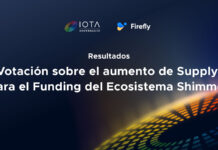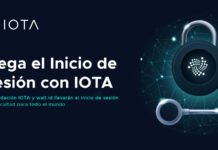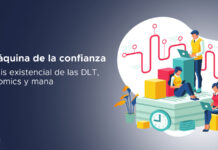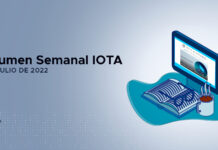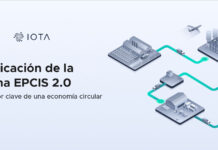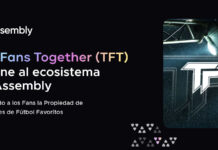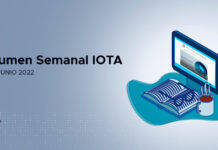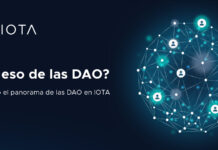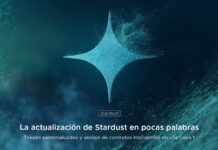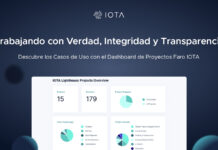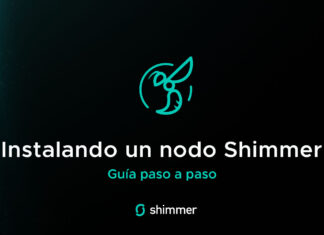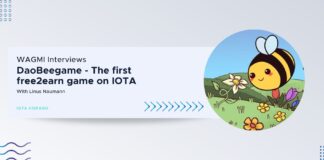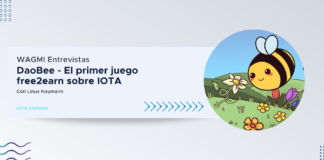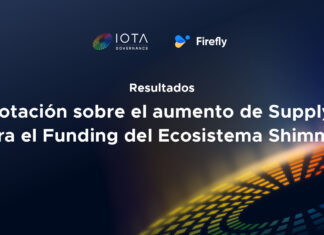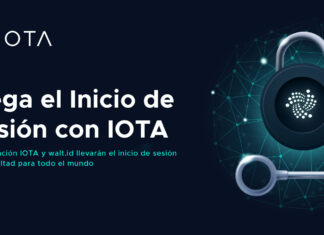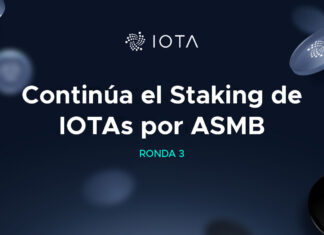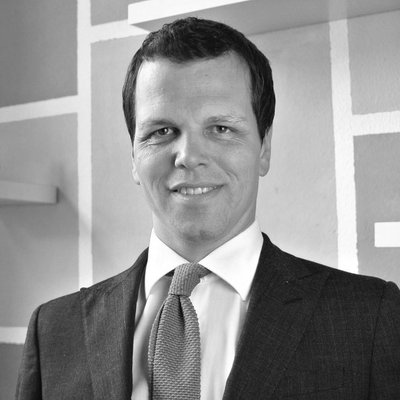
In today’s interview I am going to introduce you to a very valuable member of the IOTA community, based in the Netherlands, active, sincere in his opinions. He has a creative mind and very innovative ideas, wich you can read about at IOTA Untangled, a project he is carrying out together with his wife Hanna Vas Sambeek.
Last week I had the chance to have an extensive talk with him, we went through various topics during the communication and I must say that on that occasion he made me see things about these new technologies and how to present them to others from another perspective.
This interview definitely deserves a good read, I introduce you to Bas Van Sambeek.
Gabriela Jara
Content Coordinator and Writer
IOTA Hispano
If you like what we are doing help us to continue working! Donate: http://www.iotahispano.com/donate/
Can you tell us about you? What’s your background and what do you do currently?
I’m currently enjoying my new-born daughter. I call her my Natural Neural Network. It’s so much fun seeing her learn new things and develop into her own person, even at such a young age.
I am also contemplating a narrower focus for my company next year. I run my own business as a communication strategist. Here I help high tech start-ups and SME’s adopting new technology with a change of perspective. They all need to rebalance from inwards and technology driven, to outwards and customer driven. I translate their business strategy to communication: changing “what I do” to “what I do for you”. And give reflection from customer feedback on their business strategy. Communication works both ways, but you have to listen for it to work.
Tell us briefly about your first experience with cryptos. How did you discover IOTA?
A friend of mine was talking to me about Bitcoin changing the world in 2015, but it didn’t click back then. I didn’t see the utility of “digital money”. Interestingly enough, I was looking into sensor networks already back then. By adding sensors to buildings you could measure if office productivity was hindered by high levels of CO2, or if energy was wasted in empty rooms. I loved that. So it was sensors before blockchain for me.
Only near the end of 2016 did I get the decentralization part of blockchain. When I was ready to buy Ethereum early 2017, I ran out of disc space to download the blockchain, and that way missed the sweet opportunity of the Ethereum bull run. It did teach me a lot about important aspects of cryptocurrency, and especially some drawbacks.
I was just enjoying the increases of the first part of the bull run when I encountered IOTA. And within no time I had sold my other coins and went for IOTA. I just couldn’t justify diversification, no matter how logical it sounds from an investment strategy point of view.
What were your first thoughts about IOTA?
I researched a lot of the top 100 market cap projects, but IOTA really stood out for me. In purpose, in consensus, and in scope. My work is helping start-ups position themselves. I always press people to choose a niche. Niches to me are not about size, but about framing. Choosing a niche gives you a sense of purpose. It allows you to run your own race, without the distraction of having to look at competitors for guidance. Doing that you’re always ahead, because your competition is playing catch up at best. IOTA nailed this. I couldn’t have advised them to do anything better in that regard.
What do you think about blockchain technology?
Snowden characterised it perfectly for me: “This is the one interesting thing about blockchains: they might be that one tiny gear that lets us create systems you don’t have to trust. You’ve learned the only thing about blockchains that matters: they’re boring, inefficient, and wasteful, but, if well designed, they’re practically impossible to tamper with.”
I’m counting on the fact that with IOTA we mitigate some of the drawbacks of blockchains, although I’m okay with the boring part. Boring is good in accounting; the usecases should be the real stars.
I’ve read that your wife Hanna also is an enthusiast about DLT’s. Can you tell us about her work?
Yes she is! She’s a macro economist with a passion for sustainability and equality. She’s also got some solid statistical expertise under her belt. We decided to dive into blockchain together, doing a MOOC on blockchain together for instance.
Last year she was a researcher for the Blockchaingers Hackathon. She researched inspiration from natural ecosystems for the teams in the futuristic Machine Economy track. Leading up to the hackathon she wrote quite a few articles, which culminated in the article Talking Forests: Inspiration for Resilient Ecosystems.
In the article Hanna shares the insight that nature already has its own DLT in the form of mycelium: the underground fungal network. It can transport nutrients throughout the forests, but is also used as a communication network between trees and plants. Just like IOTA. We could and should draw inspiration from such systems when building a machine economy, because they are resilient and durable. Quite a difference from how the economy works now.
Are you currently working in some PoC using IOTA?
Yes we are. We just sent in a proposal for the Perfect Brainstorm. We worked on this together. The idea started a few months ago when Hanna was explaining linear regressions to me during dinner. (Sometimes we just watch Netflix too, don’t worry.)
I asked her what defines a good quality model, and what makes it morally acceptable. With how little most people know about statistics, it turns out this responsibility rests solely on the shoulders of the data scientist. That didn’t seem okay to me. We as a society have to just trust these people to do the right thing?
Fast forward to the competition and I was looking for an idea to send in. We came up with a solution for bringing trust into statistical modelling. The solution is an open framework that allows users to choose their own ethics charter, data hygiene standard and a way to supervise the algorithm once it’s live. Indeed: very boring. But the idea just didn’t go away. With self-learning algorithms and primitive AI’s taking over day-to-day life, we felt an urgency to solve this. These models need to be as good as they can be. So we’ve entered with quite possibly the most boring proposal of all, but that is very fitting given the boring nature of the technology 😉
What would you say to those who don’t trust in IOTA as a (future) protocol for the IoT
You might be right. Trust has to be earned. But the way I see it, the IOTA Foundation and the broader community are working hard on gaining that.
To be honest: I’m still agnostic in regards to DLT. If another project delivers a better solution, I will advise a client to go for it. I’m part of a community, not a cult. But right now I don’t see anything getting near IOTA with regards to decentralization and focus. I love the progress IF is making, the results of the Ecosystem Fund grantees, and the vibe in the broader community. Look at the number of entries in the brainstorm: 210! The momentum is insane right now. We’re making real steps into the future.
What do you think we should do as enthusiast of IOTA to encourage regular people to trust this new tech, how can we “sell” IOTA?
They shouldn’t. Friends of mine who bought crypto still have to trust me to help them hold their crypto. The core technology isn’t done yet, let alone a suitable user-friendly interface or a killer app. There is already work being done on that, but we’re still quite a few steps away from normal people using a DLT in a natural way.
I suppose one of the things we’re doing wrong here is selling it as “new money”. That isn’t what it’s about. It’s way bigger. The change it brings is decentralization; removing hubs of power that charge you for the privilege of paying someone for their work, or controlling the flow of information. The best way to sell IOTA is to emphasize the trustlessness Of both value and information exchange. In my opinion the most interesting applications lie in the data side of the project. Within economics utility is a core concept: usefulness. I think we should focus on thinking of useful applications, instead of trying to sell it as a new/better way of paying money. You’d sell IOTA short if you frame it as money.
What would you say about the work that the IF is been doing over this past few months?
They’ve been working their asses off. And if you’re watching it too closely, progress might seem slow. However, quality costs time. I’m not a fan of the old Facebook motto “move fast and break things”. It has limited applicability, and is often used in the wrong context. Don’t get me wrong, I’m impatient as hell for things like local snapshots, permanodes, and coordicide, but I then remind myself of Douglas Adams’ quote: “I love deadlines. I like the whooshing sound they make as they fly by.”
My own projects also have lots of whooshing going on too. Usually it’s due to discovering new opportunities that make a product better, or fundamental problems. It’s only logical to alter the scope then, although some people like to stick to plannings. To each his own I guess.
I do think it’s too bad there’s such a focus on the bear market right now. Both in our community and in the broader crypto community there’s this anxiety that is palpable. I get it though. Everybody thought they were “financially independently”, and got that illusion taken away from them. That hurts. But now we should pick ourselves up, and build stuff. The foundation is doing its part in my opinion.
You are also a member of IOTA Evangelist Network. How did you end up there? What is your work/role?
I was asked a few times before, but I didn’t like the name so I refused. I don’t like dogmatism, or religion, and the word Evangelist triggered both with me.
However after getting to know some people in the network I finally got over myself and joined. What I like about IEN is that the network is what you want it to be. The strength (and weakness) is that you can use it the way that works best for you, and utilize your talents best. It is up to you to make it work.
We’re always looking for motivated, knowledgable people to help promote and integrate IOTA. Drop me or any IEN member you know a line if you’re interested in contributing.
Right now, due to the slump in the market, we see a decrease in activity. But it is a nice, warm community with a lot of expertise concentrated in one Discord channel. I’m part of the admissions team, and interview new applicants. We’re checking if they would be a good match for us, but also how we can help them get the most out of it. There should be a mutual benefit, and to me part of the admission is setting a frame of what’s going to happen and what is expected. It’s voluntary work, but it gets me into contact with a lot of interesting people.
Where do you see IOTA in the next few years?
I visited CERN (European Organization for Nuclear Research) in 2013. I was in the audience at their first TEDx, later toured the CMS (Compact Muon Solenoid) detector room of the LHC (Large Hadron Collider) when it was defrosted for maintenance, learned that a lot of medical imaging technology directly originated from their particle colliders, and understood more about sir Tim Berners Lee laying the foundations of the World Wide Web there. I felt like a duck takes to water. CERN is a cradle of innovation and I decided there and then I was going to be part of one too. I just had to find the right one. IOTA right now has that vibe I felt there.
It has that same composition of passionate experts explaining the most complex things in a simple way, a big and vibrant community, and a real purpose. To me IOTA is solving the big fault that the Internet has weaved in its fabric: trust.
So think of the changes Internet brought in the past two decades, and imagine what that will allow us to do. And IOTA will be in the middle of that, I think.
Do you think that we, as IOTA community can do anything else or do something different to help raise awareness about DLT’s or IOTA in particular?
I think the awareness that is needed first is our own awareness. We all got into this for the free money at first. But some stayed long enough to learn to appreciate the tech. What we need to do now is get a deep understanding of the tech and more importantly: its implications. I don’t believe people who say they can’t contribute. We’re humans. We learn until a ripe old age. It’s all about the motivation to improve.
In the bigger picture it’s irrelevant if the cryptomarket booms again. What will money be worth – any money – if the world turns to chaos due to climate change? It is five past twelve and our parents’ generation left us with some huge problems that we have to solve, whether we want to or not. I think the decentralization of trust gives us the opportunity to change the current power structures that are keeping the current toxic status quo in place. I’m not a libertarian “screw the system” guy, quite the opposite actually, but things have got to change. And the people who are currently in power have to accept that change now, or get out of the way. With the opportunities IOTA gives us, we stand a fighting chance in my opinion.



